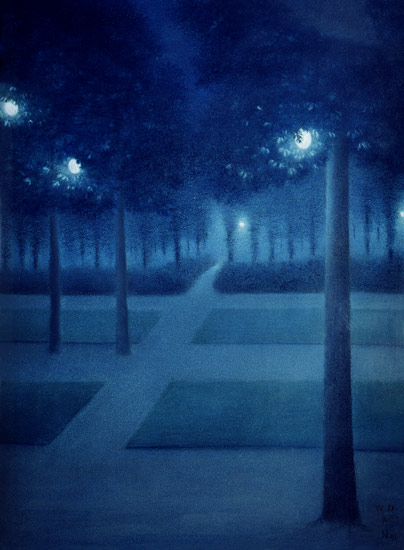
William Degouve de Nuncques
Tim Parks wrote a short essay in The New York Review of Books recently. His subject was literature and style.
He concluded it this way:
“Such is the future of literature and literary style in a global age: historical novels, fantasy, vast international conspiracies, works that visit and revisit the places a world culture has made us all familiar with; in short an idea of literature that may give pleasure but rarely excites at the linguistic level, rarely threatens, electrifies, reminds us of, and simultaneously undermines the way we make up the world in our own language. Perhaps it is this development that has made me weary with so much contemporary fiction. In particular I have started reading poetry again. There indeed things can still happen with the language, and writers are still allowed to produce texts that are untranslatable and for the most part unprofitable.”
I remember when I was, perhaps, seventeen, maybe sixteen, and I had a job working on Hollywood Blvd at Pickwick Books, later to be B.Dalton. It was a terrific multi story bookstore, decades and decades old, and this in a time before franchise book stores. I mention this because Parks’ essay reminded me of the wonder and excitment of discovering new writers — that is, new to “me” at that time. When Parks quotes Henry Green’s novel Partygoing at the top of the piece…I was transported back to a fleeting and shadowy emotion I associate with all great literature…
“Fog was so dense, bird that had been disturbed went flat into a balustrade and slowly fell, dead at her feet. There it lay and Miss Fellowes looked up to where that pall of fog was twenty foot above and out of which it had fallen, turning over once. She bent down and took a wing then entered a tunnel in front of her, and this had DEPARTURES lit up over it, carrying her dead pigeon.”
If you were trying to learn to write, that is to write something approaching a distinctive and beautiful limpid prose, Green was one of the guys you were supposed to read. You were supposed to read “Travels in Arabia Deserta” by Charles Doughty, and to read Izak Walton’s The Compleate Angler (sic). These were the secret prose stylists of the English language. You could add T.E. Lawrence, and then read Djuna Barnes, and Flannary O’Connor. The point here is that there was an excitement in discovering one’s secret personal library. Years later in New York when I had a job at The Strand, in the basement, I discovered Blaise Cendrars’ Moravagine. Unimaginable that I had never heard of this book. How did that happen? My point really, is that today, the quality of English prose is so wretched, so puerile, that I think I have almost forgotten that almost conspiratorial sense of the immortality that exists in great art.
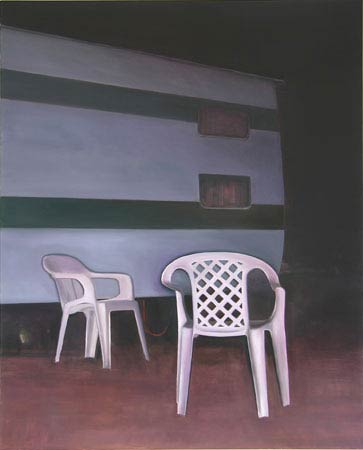
Ingmar Alge
Here is a short bit of Doughty’s prose…
“The cisterns are jealously guarded; as in them is the life of the great caravan. No Aarab (nomads) are suffered to draw of that water; the garrisons would shoot out upon them from the tower, in which closed with an iron-plated door, they are sheltered themselves all the year from the insolence of the nomads. The kellas stand alone, as it were ships, in the immensity of the desert; they are not built at distances of camps, but according to the opportunity of water; it is more often two or even three marches between them. The most difficult passage of the pilgrim road before Medina, is that four or five marches in high ground next above Medain Salih where are neither wells nor springs, but two ruined kellas with their great birkets to be filled only by torrent water, so that many years, in a nearly rainless country they lie dry. A nejjab or post, who is a Beduin dromedary-rider, is therefore sent up every year from Medain Salih, bringing word to Damascus, in ramathan before the pilgrimage, whether there be water run in the birket at Dar el-Hamra, and reporting likewise of the state of the next waters. This year he was a messenger of good tidings, (showers and freshets in the mountains had filled the birket) and returned with the Pasha’s commandment in his mouth, (since in the garrisons there are few or none lettered) to set a guard over the water. But in years when the birket is empty, some 1500 girbies are taken up in Damascus by the Haj administration to furnish a public supplement of five days water for all the caravan: these water-skins are loaded betwixt the distant waterings, at the government cost, by Beduin carriers.”
Doughty was writing, like Green, an unnatural and paradoxically perfumed English, both heady and florid, but also expressing the same almost mystical austerity as The Book of Common Prayer.
I wanted to digress slightly, for several things stuck me this week, as I read some threads in social media, and in cyber discussions and conversation. When I speak with people in the U.S., I am invariably struck with one of about three things that crop up in each dialogue. One is anger. Its a rather unnaturally angry society. The second is just how badly educated most Americans are. And coupled to that second quality, comes resentment. But it’s not a scatter shot resentment. It is a somewhat narrow cultural resentment. That people hate art is obvious. One of the most reliable verbal or written confirmations of ‘art-hate’ is to hear ” whatever moves you, is valid as art” (or something of that sort; whatever you like, or the old I may not know what art is, but I know what I like). The problem is, where this was once the intellectual territory of the terminally uneducated, such sentiments are now heard among University educated youth. Part of this, I sense, comes out of a real psychic fatigue with marketing, and with our hyperbranded reality. But the other part has to do directly with simple ignorance. It is very rare to find young writers searching the shelves of bookstores (and well, there are no bookstores anymore — argue all you like, but Los Angeles, for example hasnt a single decent book store, not one) and discovering the strange seductions of name, and title, and maybe jacket cover art, that freeze one in almost an erotic paralysis. Of course, youth is part of this, that so many authors are yet to be discovered. One of the saddest days of my life was finishing the last fiction of Dostoyevksy I had yet to read. I could re-read, of course, but officially, I had read every word of his fiction. Or Kafka. Or Melville. I remember a summer spent laying about a so-cal beach and reading nothing but William Burroughs. Nothing. Now, to return for a second to prose, to the artistry and poetics of language; what Parks called style, and its erosion, the wearing away of meaning in words. And the desedimentation of sentences, of paragraphs. For both seem crude, and in a sense it’s a failure of breath. The layers, the embedded mystery of certain sounds, and even the look of a page, the paragraph breaks, all of this feels flattened out now. Park’s point is that there seems to be little writing that de-unifies and disrupts and awakens.
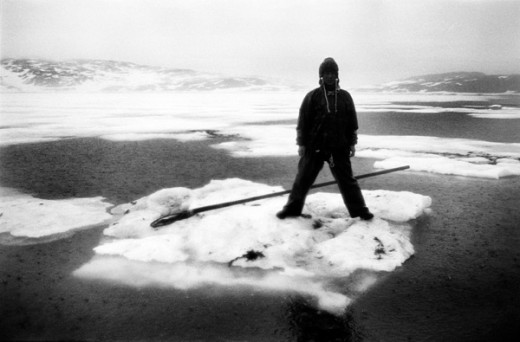
Jacob Aue Sobol
Now, one of my favorite contemporary writers is James Kelman, the Scotsman, who wrote one of greatest works of fiction, to my mind, in the last thirty years, with How Late It Was, How Late. Now, when I first picked up this book, I struggled for a few pages for the book is written in a Glaswegian dialect, and the vernacular is dense and oddly hallucinatory. By the end of the book, which I had trouble putting down, I still did not understand parts of it, in fact whole great chunks of it. Which raises the question of what and how we “understand” a work of fiction. In truth, I find very little, almost zero contemporary fiction to be worth reading. To be, literally, readable. Something happens when you open to the first page of a bad contemporary work of fiction. It is like being given a very slight lobotomy, a micro lobotomy, and the numbing tends to travel downward , carried in your blood, and it anesthetizes as it travels. One of the qualities of this MFA-ish prose is how understandable it is. The way an instruction manual or a brochure offering cemetary plots are meant to be both understandable (for a wide audience) and also inoffensive. I’ve noticed recently how inoffensive coincides with, often anyway, the intentionally ‘shocking’. Shock value, outrageousness, these are terms of domestication, actually. It is almost as if one can identify something as “shocking”, or that somehow an event, a performance, or even an object, an image, can be so described, it has failed. It has failed because that quality of faux offense (for real offense engenders a totally other sort of reaction, but more on that later) is a surface experience, and prose, or any artwork that has depth, and mystery, cannot really be initially experienced as shocking, nor can it be experienced as innovative. The pseudo contradiction of shock value and inoffensive speaks to the sense I have of manipulation, of constant unyeilding and punishing manipulation. It is all marketing. Theme, opinion, message; these serve as the glaze on the tasteless white pound cake that is the actual artwork. The idea of ‘shock’ has normalized now.
There is another obvious point here, and that is the sheer amount of work, of product, that is produced. The constant beat of “NEW”, of a summer collection, of debut and premiere has created one fractyl of the cynical that permeates the West today. A result of the loss of the avant garde is that marketing has now utterly overtaken all cultural output. The audience, the reader, the viewer, cant hear…they can’t hear, they can’t see, they don’t narrate. The mimetic, a term I come back to all the time, has atrophied.
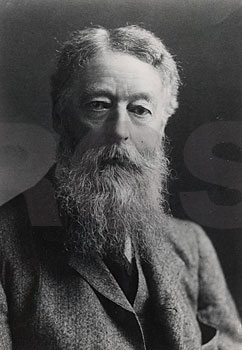
Charles M. Doughty
There is a connection here, not surprisingly, with ‘realism’. There has been a trend, already existant, actually, of authorial invisibility, with corporate cultural product. When I wrote about Homeland this week, I realized most of the audience thinks of the author, if they think of it at all, as Showtime. This is Showtime’s new series, Homeland. Couple to this, all the many ways that points of view have homogenized, and with the mandate of description of landscape, or scenic description. Whatever term is used, it remains the most complicated of trends — not to say it is not still conformist. But to describe a scene, in prose, or to film a scene, is to tacitly adhere to a set of principles and rules. A sense of unifying principles. This realism, though, is challanged by genre. At least in the culture industry. Fantasy and sci-fi, and even sit coms, all exaggerate and modify these rules. I read a review somewhere of the new network show The Blacklist. What was interesting was that the reviewer said the problem of the show was that it was being asked to be taken seriously, when it fact it wasn’t meant to be realistic. It was meant to be a sort of cartoon, and that a show as absurd as Sleepy Hollow actually was more successful at what it set out to do, which was to create a sort of goofy semi comical fantasy world of supernatural events. Now, this is actually pretty perceptive. And it is basically true. Now, both of these shows are hardly meant to be taken very seriously. And that’s fine. But this review raised the issue of artworks, of narrative, including a self marketing dimension to their presentation. In other words, Sleepy Hollow announces itself as lightweight and meant mostly for children (which today, is just a sub category of adult entertainment). Still, all these shows, all of them, exist with more in common than in difference. The mimetic engagement, of which I have written a lot and of which I am sure I will write much more, always evokes history, our own, and that of our culture. For there is always an echo of the past, however faint, in work that rises to the level of mimetic interelationships with the audience. The sense of a long history of societal domination, of suffering and mortality, are resonant because of the recognition of the collective history of which we, the subject viewer, are a part.
One reason for the importance, or dominance, of genre today is that genre always includes a comparison with another similar example of the form. You don’t know it’s a western unless you’ve seen other Westerns. You don’t know the novel is a detective novel unless you have read other, or know of other examples of detective novels. Hence, the awareness of history, and what the culture industry seems unable to understand, or what they simply don’t care enough about to understand, is that this historical echo, or shadow, is what provides relief from the existential vertigo of pure advertising.

Fernand Khnopff
The self advertising aspect is certainly true in fine arts as well. With post graduate fine arts programs, the department heads and instructors have it in their interests to groom the most vendable product, the “artist” most marketable, and to find that “summer collection”, the newest line of trainers or handbags, but in this case ‘art’.
However, looking at narrative, and how genre works today, there is this strange overlap, or mediation by constituted by interpretation. Notwithstanding the post structuralist Deleuzian and Derridean focus on how things work, and not what they mean, the poetics of narrative really escape from both these traditions or practices. Firstly, art has no meaning per se. Secondly, the Deleuzean aspect is no less problematic, but requires more discussion. As Jameson say, every universalizing approach will be found to conceal its own contradiction. It will aslo conceal at least part of its history. Or its historicity. It is at this point that the engagement with this history of social domination, of power and control, becomes relevant. The obvious role of ‘otherness’, of archetypes of the stranger or outsider, are constituent of the subject perceiving them. Narrative does not escape its own involvement in history; the tensions of scapegoating, of sacrifice, etc. These echoes are implanted in, and actively evolve the language itself. In a sense, these are factors in any recognition of poetics. As Tim Parks points out in his brief comments on the Henry Green, this is not normal English, the dropped articles, the fragmented syntax, and most significantly, the dissolving (though only partially) of coventional descriptions of space (the scenic, or landscape). In the Doughty, the observer is noticable by his choices of what to describe, and when, and of course how. This is the essence of an aesthetic response, and it is embedded in the mimetic process.

Baghdad, 1965
This photo of Baghdad, mid sixties, is inscribed with the tragic. The reasons are fairly obvious, but the lingering pain of this shot is also in those ‘Kodachrome II asa 25’ colors, the slight instability now, years later. For different generations the inscription changes, in the same way, my memory of color substraction photos (popular in National Geographic in the 50s) remains poignant. Here, that desert sky, the palms, the sense of oddness, some metaphysical shadow hangs over the scene, the silence of future destruction. Now, this is image. The prose of TV news readers, the fixed rictus grins, the Temptu Hi-Def pancake #2 starting to run under the lights…these embedded half memories, palimpsests, also find voice, grow in the lexical continuum of the West.
There are fossilized traces of earlier cultural tensions. Again, of domination, of privilege and violence. What I feel is missed in most all of these approaches has to do with the migrations of tensions, of violence and sado-masochism, for example in what became the sentimental. The democratizing of mass produced narrative product has had an effect on language. Tom Clancy writes a prose of entirely migrated meanings. There is a cruelty layered in the sentimentalized language of melodrama, and there is a familiarity and constant reiforcement of predictable repetitious sentence cadances, rhythms, and in the instrumental logic of plot. Not to mention, obviously, the fascist political opinions and basic world view. In fact, there are two writers in English, both American, 20th century, who went out of fashion because of a misreading: Dreiser and Inge. One a novelist, the other a playwright. Looked at today, neither writer seems particularly ‘realistic’ to me. They simply have too many layers, both are too sweaty beneath their somewhat placid exterior. Both are writers of repression. Both captured, and found expression, a particular quality of the American psyche, the Protestant and Calvinist stoic disfigurement of
emotion, of personality. Their landscape is one both familiar, and not familiar. And even the familiarity is only one that makes sense at first glance. Or momentarily, for soon the landscape retreats, the signposts that the reader anticipates fail to appear. Dreiser is no doubt the more significant writer. His is an ur-American unconscious, and creeping through the quiet of his scenic sketches is a deep pain and grasp of social humiliation. Dreiser was born into acute poverty, the ninth child of German immigrant parents in Terre Haute, Indiana. Dreiser came into his mature life at the turn into the 20th century. He studied only briefly at the modest Indiana U., then found work in Chicago writing for newspapers. Throughout his life Dreiser remained a contested figure in literary circles, and with critics. Dreiser’s greatest work, and a work second, probably, only to Moby Dick for greatest American novel, was An American Tragedy. A crime story, based on a true crime. In a sense, it is proto-crime fiction, a dark class analysis, as well as a deep investigation of guilt, of childhood trauma. It’s probably the ultimate Reichian novel.
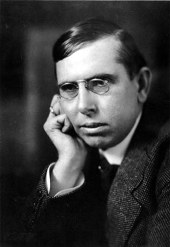
Theodore Dreiser
Dresier has been ridiculed, in fact, for his “clumsy” prose. In fact, it’s not clumsy, but degraded and unwashed, much as his characters are. He is the anti Scott Fitzgerald in a sense. For Dreiser knew that he had no grasp of the upper classes, that he only could view them from afar, much as Clyde does in An American Tragedy. Upper class critics have never been able to embrace Dreiser, up to and including David Denby several years ago upon the re-issue of An American Tragedy. Dreiser wrote of the twisted moral inner worlds of small town middle America of the 1920s. He wrote a brutal forward moving prose that attacked the very idea of “elegance”. And he sensed that class was the single determining factor in a societal unhappiness, an unhappiness he felt himself. Dreiser wrote the way he wrote when working as a reporter. But it is as if he were a reporter straight out of the Old Testement, by way of Terre Haute.
From the opening scene of An American Tragedy:
“And up the broad street, now comparatively hushed, a little band
of six,–a man of about fifty, short, stout, with bushy hair
protruding from under a round black felt hat, a most unimportant-
looking person, who carried a small portable organ such as is
customarily used by street preachers and singers. And with him a
woman perhaps five years his junior, taller, not so broad, but
solid of frame and vigorous, very plain in face and dress, and yet
not homely, leading with one hand a small boy of seven and in the
other carrying a Bible and several hymn books. With these three,
but walking independently behind, was a girl of fifteen, a boy of
twelve and another girl of nine, all following obediently, but not
too enthusiastically, in the wake of the others.
It was hot, yet with a sweet languor about it all.
Crossing at right angles the great thoroughfare on which they
walked, was a second canyon-like way, threaded by throngs and
vehicles and various lines of cars which clanged their bells and
made such progress as they might amid swiftly moving streams of
traffic. Yet the little group seemed unconscious of anything save
a set purpose to make its way between the contending lines of
traffic and pedestrians which flowed by them.
Having reached an intersection this side of the second principal
thoroughfare–really just an alley between two tall structures–now
quite bare of life of any kind, the man put down the organ, which
the woman immediately opened, setting up a music rack upon which
she placed a wide flat hymn book. Then handing the Bible to the
man, she fell back in line with him, while the twelve-year-old boy
put down a small camp-stool in front of the organ. The man–the
father, as he chanced to be–looked about him with seeming wide-
eyed assurance, and announced, without appearing to care whether he
had any auditors or not:
“We will first sing a hymn of praise, so that any who may wish to
acknowledge the Lord may join us. Will you oblige, Hester?”
Dreiser is the worm infested reverse side of Norman Rockwell. He is the more feverish version of Frank Norris, and for me, his descendent is Inge. The point though, is that this not normal English either (per Parks), this is a hick version of Book of Job. It is awkward, and unattractive, and its features are those of the peasant, blunt, and callused. It is a novel of dirty finger nails. And even Denby admits by the end, that it is a work of ‘extraordinary dignity’.

Tulsa, Ok. bus station
So, this is what awakens the reader in a mimetic process with Dreiser, the gradual wearing down of familiarity. And the search that drives the novel. That search which is a secular quest for revelation. And despite the prevailing wisdom on Dreiser, its not an inaccurate description to link him to the allegorical. The flattened prose of MFA programs, the cleverness, the glibe winks at the reader, and the odious complicity with domination is, in Dreiser, held up like a mason jar of formaldehyde. A medical experiment, to be returned to, to study, to take out of the musty closet for re-examination. One other factor seems obvious, Dreiser couldnt have written an ironic sentence if he tried. And he never tried.
There are structual elements, forms, and styles of expression, both in writing and image, that reclaim something of a lost mythic apriori. The primordial silence that Merleau Ponty mentions. It increasingly becomes, as Jameson observes, via Lacan, the missing presence. This is only another way of discussing the uncanny. And this propostion is repeated in countless depictions of empty streets, or abandoned interiors, or in ruins. This is also (as Jameson says as well) the Heideggerian notion of forbodings, linking to how the worldliness of the world pokes out of of the normal scenic. But really, you find these images in Hopper, in Kafka, in contemporary painters such as Ingmar Alge, the Austrain neo realist, or neo hyper realist. Or, you see it in figures whose back is turned to the audience. Romantic painters such as Caspar David Freidrich, often painted a single figure, back to the observer. These qualities are found in the language of Dreiser, it is a prose of a secret map found hidden under the desk drawer. Juan Rulfo the great Mexican writer, did much the same thing. It is what seperates his writing from that of Marquez say. One is searching the back of the mirror for a hidden meaning, one is not.
Cortazar bores me, because his fantastic is a reified fantastic. It announces itself, it is a precursor of self advertising. Rulfo is something else, and because you cannot hope to hunt down the meaning, you are left with those contours of form that linger as after images, or ghost images in the mimetic imagination. Patricia Highsmith, and Paul Bowles are both the tourist, the neo colonialist, who succombs, and submits to his or her own damnation. If you strip away the plots, you are left with only those empty rooms, the sweltering heat, or the noise in the apartment next door. Noise that always contains an edge of violence. The truth of a Highsmith is in her sensitivity to the violence that she felt everywhere. Compare Highsmith to Zadie Smith. Bowles to Jonathan Safran Foer.
In that dignity recognized in Dreiser, is reclaimed an honest testimony. When one reaches Beckett, testimony is no longer enough. This is why, probably both Bresson and Pasolini loom so large, cast such giant shadows. They form the other branch away from Beckett, in a sense. They can only exist, finally, because of him, but they demand dignity, and they demand, finally, that suffering be recognized. For one it was religious, for the other political.

Alex Colville
The language of lonliness, that found in everyone from Melville to Jean Genet, is another version of those islolated figures in Hopper, or in Alge, or the tortured screaming Pope of Bacon. They are all related. The ‘confidence man’, the narrator of The Killer Inside Me, or the voice in Goalie’s Anxiety at the Penalty Kick, or Joseph K. This is the landscape of the Old Testement, and one repeated in another way in Shakespeare. For these narratives posit what in theatre is the ‘off-stage’. There is an elsewhere, a room next door where a murder is taking place, or there is a room in our brain in which someone else is torturing….well, someone. Us? The mass produced kitsch product, the repepitive stories of social domination, the peddling of untruth as entertainment, the normalizing of violence, is clear, but it is also the washing away of any heterogenization in language. The flattening of dialogue to either sentimental pandering, or a generic corporate language, the kind of conversation one hears in board rooms. It is the language of politics. It is the language of ‘spin’. Words lose their historical underpinnings, discussions take on a numbing sameness, a bland generalized discourse from an educational system predicated on multiple choice testing.
The journals of an Isabelle Eberhardt, or even Doughty, are replaced by travel journals about the author. The author remains opaque, however, for that authorial voice is manufactured. And part of this manufacturing process has to do with the use of this sanitized language. In a sense it’s a distortion to label this narcissitic. It’s not even that, it’s the simulacra of narcissism, or the reified narcissitic. The corporate peddling of “me”, of the privilege of identity, takes place in a culture of an ever shrinking ego. The audience is more reflexive, more prepared for agreement, than even twenty years ago.
Now there is also another approach to even the word “genre”, and this is sort of closer to the old Leavis or Mathew Arnold world of criticism. Oddly, I find those critics welcome reading these days, such is the increasingly tedious nature of post structuralist thought. But I digress. My point has to do with the sense that narrative today largely serves a single, and superficial, need. There are obvious exceptions, but in general, in fine arts, too, a specific sort of mediocrity is promoted. And the first qualification is that it be as depoliticized as possible. Marina Abramovic comes to mind. But there are certainly many others. The voice, the language, the vision of artworks that sought, first, to question form, seems to shrink every year. The desire to provide, or demand, difficulty — that the very rhythm and density, or spareness, of the language, creates something akin to respect. An innate pause, and that pause is both the literal and figurative space in which the uncanny, the allegorical, can begin. The breezy ironic prose of ‘entertainment’ is consciously designed to stop pauses. There are interesting technological linguistic patterns that none of us escape. “Sleep mode”. The computer model of being human is ever more creepy. Anyway, the pause, the decision to engage, that process is partly the basis of all narrative.
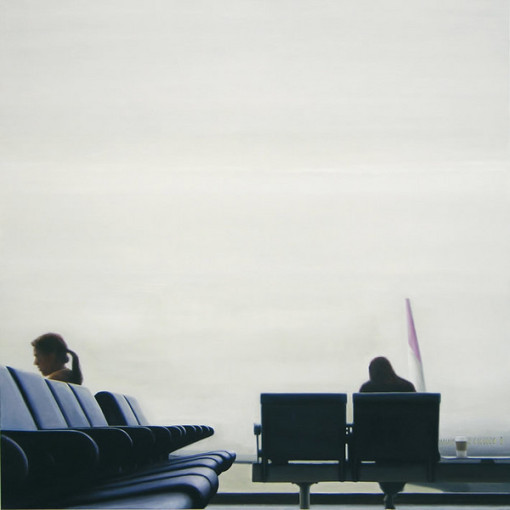
Ingmar Alge
Jameson saw ideology behind all the functions of genre, and alongside that is the nature of the reader.
“Dialectical thinking can be characterized as historical reflexivity, that is, as the study of an object (here the romance texts) which also involves the study of the concepts and categories (themselves historical) that we necessarily bring to the object.”
Inscribed in all prose, all narrative, are the trace elements, as well as clear structures, of previous societal dynamics. This the buried political dimension, and it is what one feels in Dreiser (for example). Developing the sensitivity to hear and feel these inscripted fossiles is exactly how texts open themselves to the reader. So, to return to the Parks essay, and to that refuge, that space that art gives the viewer or reader and that provides comfort; I think this is more and more often erased by the products of the culture industry. The is part of the grand police state apparatus. Closing libraries, which were at least places of public quiet, and constant surveillance by the man. The fragmenting nature of computer and internet reading, the loss of bookstores, of communities of readers; these are things trivialized by media, by a snarky liberal culture, a brutalized underclass with ever less time for anything but survival, and without that refuge, I suspect, the anger and resentment, the need for scapegoats, will only grow.
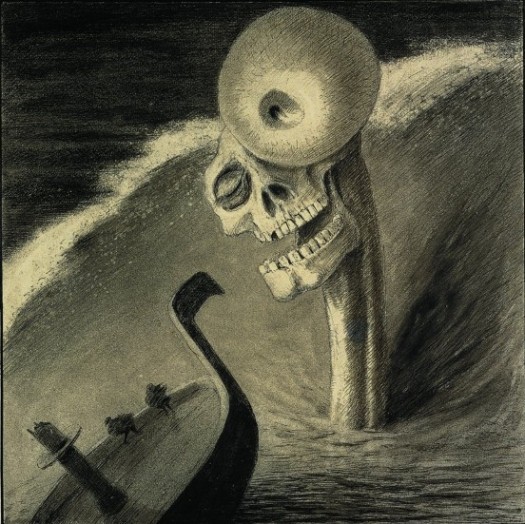
Alfred Kubin

Kelman, yes – have you read A Disaffection? The dialect is much less forbidding because the protagonist (not a first-person narrator) is a schoolteacher, but it is no less intensely strange than his other work, and what you call, very suggestively, ‘the off-stage’ is perhaps the real protagonist throughout. Two cardboard pipes, found in the back yard beside the toilet behind the Arts Centre where the teachers drink — one knows that those pipes constitute some kind of provisional lifeline for the protagonist, but they are no “reified fantastic”, they are merely what they are, no less than that.
This latest piece of yours also brought back to me the experience of reading Alan Garner’s Red Shift when it first came out, rushing off after school to John Smith’s now-defunct bookshop in central Glasgow to read the entire hardback in the shop over the course of two or maybe three evenings (I couldn’t afford it and felt weirdly reluctant to steal it) and coming out dazed. I couldn’t tell if I was elated or bereft.
The wounds of class, and the emotional and linguistic vacuum of contemporary middle-class life, are very strong presences in the work of both those writers, no less strong for being mainly off-stage.
Tim Parks’s own case is interesting. i remember being excited by his work when I first encountered it about a decade ago (I said to a German, “He’s like an English Thomas Bernhard, if you can imagine such a thing”) but it started to pall on me after a while, it began to feel like a shtick, an automatism. And I think it began to pall on Parks himself too. I stopped reading him. Then a couple of years ago he wrote something non-fictional & very compelling called Teach Us To Sit Still, about the effect five decades of increasingly manic mental and verbal activity had had on his body, and how he dealt with it. Then he went off and novelised the whole damn experience!, as if automatically, in another book, a quick and dreadful follow-up novel with a first-person female narrator. I think he has reached or is reaching the limits of his own fiction, but he is becoming a very interesting writer again.
Parks: “Perhaps it is this development that has made me weary with so much contemporary fiction. In particular I have started reading poetry again. There indeed things can still happen with the language, and writers are still allowed to produce texts that are untranslatable and for the most part unprofitable. ”
Let It Go
It is this deep blankness is the real thing strange.
The more things happen to you the more you can’t
Tell or remember even what they were.
The contradictions cover such a range.
The talk would talk and go so far aslant.
You don’t want madhouse and the whole thing there.
– William Empson
yeah, Empson. He and charles Olson have somehow become sort of forgotten, and I dont know why. Empson was such a great critic, too. I will order the garner straight away. Odd Ive never heard of him. Nice when that can still happen.
And yes, Parks is odd. I had much the same trajectory of feeling about him that you had…..he began as a fresh clear voice, and then , I dont know, got swallowed up in the NYRB crowd….but this was a nice piece.
Its hard for guys like Parks I think. Vollman isnt greatly different in that he can write something so substantial, like Imperial……..which is really a special sort of book, and then resort to the worst sort of posturing and narcissistic self marketing.